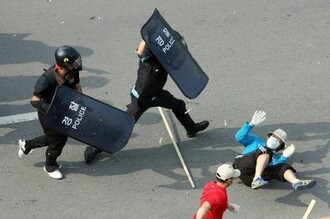hankyoreh
Links to other country sites 다른 나라 사이트 링크
Letter added to FTA causes controversy

South Korea and the United States released the complete text of their Free Trade Agreement (FTA) on July 2. However, a controversy is expected as the United States version did not include a formal letter, containing procedures for dispute settlement in labor and environmental issues, while South Korea’s version of the document did. So far, the South Korean government has described the letter as a safety pin, preventing the United States from inappropriately using dispute settlement procedures, when it accepted the U.S. demand to include tougher labor and environmental provisions in the agreement.
According to the full text of the agreement, posted on the Web site of the Ministry of Foreign Affairs and Trade, the letter allows each side to use dispute settlement procedures, requiring that both sides use these procedures only for labor and environmental cases related to the economic effects of trade and investment. The text, in the form of a letter from U.S. Trade Representative Susan C. Schwab and sent to South Korea’s Trade Minister Kim Hyun-chong, read that ‘‘Both Parties reaffirm their commitment to consultation under the Agreement in order to resolve any potential differences that may arise in these areas [Labor and Environment] and, as responsible trading partners, would resort to dispute settlement only in cases with merit where trade or investment effects can be established.’’ This letter, however, was not posted on the Web site of the U.S. Trade Representative.
In renegotiations, the United States asked South Korea to adopt ordinary dispute settlement procedures for retaliations in case of a violation of provisions related to labor and the environment. However, South Korea refused to do so and instead made a compromise, asking the United States to use the dispute settlement procedures only for cases related to trade and investment. Accordingly, the United States offered the letter authored by U.S. Trade Representative Susan Schwab that contained the South Korean request, and South Korea trumpeted the separate text as a ground to maintain the balance of interests in the renegotiations.
On June 29, the South Korean government announced that the separate text would apply to both nations.
However, some experts have raised questions over the legal effect of the letter, given the fact that the U.S. text did not originally include it. Song Gi-ho, a trade attorney, said, ‘‘If the letter has legal force, it should be included in the U.S. text. (Given the fact that the letter wasn’t included in the U.S. text) it raises the possibility that the U.S. may decline to accept the letter as a document with legal force.’’
In the complete text of the trade agreement released by the U.S. government, four other letters were included, including those on matters dealt with in other chapters of the agreement, specifically: Textiles and Apparel (fibers, yarns and other fabrics not available in commerical quantities), Cross-Border Trade (domestic postal delivery), Electronic Commerce (access to and use of the Internet) and Publication (public comment period).
In response, Lee Hye-min, South Korea’s deputy chief negotiator to the free trade talks between South Korea and the United States, said, ‘‘The U.S. may not include the letter in the complete text because it is a separate document, not a confirmation letter, which is an integral part of the text. We will be able to get the same effect as stipulated in the letter when the agreement is translated, due to the fact that we have included it,’’ Lee said.
Please direct questions or comments to [englishhani@hani.co.kr]
Editorial・opinion
![[Column] Has Korea, too, crossed the Rubicon on China? [Column] Has Korea, too, crossed the Rubicon on China?](https://flexible.img.hani.co.kr/flexible/normal/500/300/imgdb/original/2024/0419/9317135153409185.jpg) [Column] Has Korea, too, crossed the Rubicon on China?
[Column] Has Korea, too, crossed the Rubicon on China?![[Correspondent’s column] In Japan’s alliance with US, echoes of its past alliances with UK [Correspondent’s column] In Japan’s alliance with US, echoes of its past alliances with UK](https://flexible.img.hani.co.kr/flexible/normal/500/300/imgdb/original/2024/0419/2317135166563519.jpg) [Correspondent’s column] In Japan’s alliance with US, echoes of its past alliances with UK
[Correspondent’s column] In Japan’s alliance with US, echoes of its past alliances with UK- [Editorial] Does Yoon think the Korean public is wrong?
- [Editorial] As it bolsters its alliance with US, Japan must be accountable for past
- [Guest essay] Amending the Constitution is Yoon’s key to leaving office in public’s good graces
- [Editorial] 10 years on, lessons of Sewol tragedy must never be forgotten
- [Column] A death blow to Korea’s prosecutor politics
- [Correspondent’s column] The US and the end of Japanese pacifism
- [Guest essay] How Korea turned its trainee doctors into monsters
- [Guest essay] As someone who helped forge Seoul-Moscow ties, their status today troubles me
Most viewed articles
- 1[Column] The clock is ticking for Korea’s first lady
- 2Samsung barricades office as unionized workers strike for better conditions
- 3[Correspondent’s column] In Japan’s alliance with US, echoes of its past alliances with UK
- 4After 2 months of delayed, denied medical care, Koreans worry worst may be yet to come
- 5[Column] Has Korea, too, crossed the Rubicon on China?
- 6Hong Se-hwa, voice for tolerance whose memoir of exile touched a chord, dies at 76
- 7US overtakes China as Korea’s top export market, prompting trade sanction jitters
- 8All eyes on Xiaomi after it pulls off EV that Apple couldn’t
- 9[Photo] Smile ambassador, you’re on camera
- 10[News analysis] After elections, prosecutorial reform will likely make legislative agenda